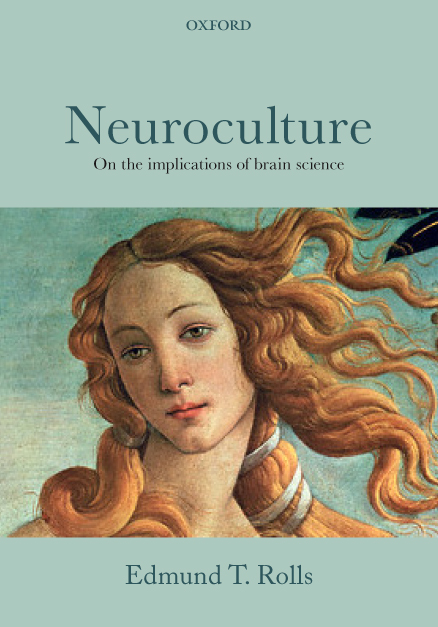|

Order
book from OUP
Contents and Sample Chapter
Neuroculture.pdf
|
Neuroculture
Oxford University Press.
ISBN 978-0-19-969547-8
- A
wide-ranging look at some fundamental and important questions in human
behaviour, showing how the neurosciences can inform and enlighten us on
many disparate aspects of everyday life
- Written by
a eminent brain scientist and presenting cutting-edge research from
neuroscience, this is an authoritative and informative book
- Aimed and
accessible to a broad audience. Because the book tackles questions many
of us will consider in our everyday lives, the book will have
widespread appeal across the sciences and humanities
Why do we have emotions? What are the bases of social behaviour? What
is the relationship between the mind and the brain? How, and why, do we
appreciate art? How do we make decisions? Are there biological
foundations to ethical behaviour? Why do people follow religions, or
believe in life after death?
These wide-ranging, but important questions are just some of those
considered in this exploration of the field of neuroscience, and how it
can crucially inform our knowledge across a range of seemingly
unrelated disciplines.
'Neuroculture' considers the implications of our modern understanding
of how the brain works, how it was shaped by evolution, and how it can
help us understand many mental issues central to everyday life.
The book starts with a look at emotions and how they are important in
our behaviour. It then considers social behaviour, looking at the
adaptive differences between men and women. The next chapter considers
emotion and rationality, and the mechanisms of decision making. In the
following chapter, the author looks at philosophical issues,
considering the relationship between the mind and brain, and
considering whether the hardware/software distinction in a computer
might tell us something about mind-brain interactions. The following
chapter considers neuroaesthetics - the biological foundations of our
appreciation of art - including visual art, literature, and music. Is
art a useless ornament?
After this, the author looks at the field of neuroeconomics - how
neuroscience is informing us about how we make economic choices. The
wide-ranging chapters that follow consider neuroethics - the biological
foundations of ethical behaviour, neuropsychiatry - the connection
between neural functioning and psychiatric disorders, neuroreligion -
the possible biological foundations of religious belief, and
neuropolitics - how our knowlege of the emotion and rational reasoning
systems might help us develop strategies to solve political problems.
Written to appeal to students and researchers across the biological
sciences and humanities, Neuroculture will be fascinating reading for
those in neuroscience, psychology, biology, medicine, economics, animal
behaviour, psychiatry, philosophy, the arts - indeed anyone interested
in why we behave as we do.
Readership: Students
and researchers across the biological and brain sciences, philosophers
of mind, and those with an interest in economics and decision making.
|